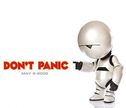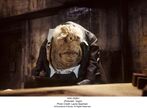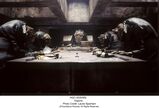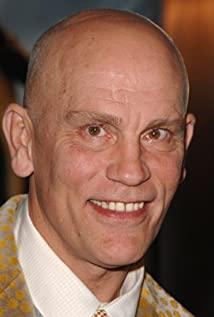(Off-topic: One eerie similarity between "The Hitchhiker's Guide to the Galaxy" and "Gulliver's Travels" seems to be mistaken by many for children's literature? At least when I tried to introduce the film to a few close friends , all got the conclusion that this sci-fi movie is childish, not serious, immature, and incomprehensible. Maybe it is because the dark humor of the British is originally childish innocence?)
"Gulliver's Travels" is a great The satirical novel, satirized objects ranging from the British, the French to the whole of Europe and then to the whole of mankind, the royal family, politics, emerging science, religion and even human nature are all insinuatedly attacked. The Hitchhiker's Guide to the Galaxy satirizes these things in almost the same way, not sure what the point is.
The satire of philosophy - the plot about the ultimate question and the ultimate answer couldn't be more obvious. The contemplative computer can be described as the ultimate philosopher, who can think about a problem for 7.5 million years without eating or sleeping. Found the answer but found that he did not understand the problem, and had to turn to another more wise man - the earth and human beings. It's a pity that both computers and human beings are degenerate before getting the problem. The brooding computer has become a boring existence watching childish cartoons all day long, and the human being has become a waste like Arthur Dante. The question was finally revealed, but it came from Arthur's wit when he was in danger - the ultimate question turned out to be "how many roads does a man have to walk in his life", which seems to be a famous lyric by Bob Dylan I remember. So what happened to all the philosophical thinking before that?
In addition, the film has many satires on philosophical thinking and self-knowledge, such as the big-headed robot suffering from depression, and the contrast between whales and flower pots. It can be seen that the director or author has a lot of prejudice against philosophy and philosophers.
The satire of religion - that "snot-wiping god" needless to say, is definitely satirizing religion.
Irony of Science - The most technologically advanced race in The Hitchhiker's Guide to the Galaxy is undoubtedly the Vogons, but they are actually disgusting and evil innate wild animals on a planet where all new ideas are forbidden. Ford said they "They don't think, they just run things". Humans think they have strong thinking and advanced scientific theories, and finally even their homes were demolished by the Vogons. This plot gives me the feeling that human science is something that is just talk and practice, or is it meaningless for science to be ahead of technology for too many years? The bizarre setting of the Vogons is somewhat similar to the plot of the flying island country in "Gulliver's Travels". I tentatively think it is a satire on human science. If you have a better understanding, please tell me.
Literary satire - this one really doesn't make sense. Why do you think human poetry is inferior to Vogon shit poetry? I don't know who Paula Nancy is, but I think if this poet exists, he'd be shot while lying down. Or is it satirizing the self-appreciation characteristics of literary and artistic people, or is it satirizing the evaluation system of literary works? In short, there is no doubt that literature has been shot in some way.
Irony of politicians - no doubt, politicians only need those parts of the body that are on top of the podium, and it doesn't matter if there are thousands of weird bean sprouts mechanical legs below. Wisdom is even less needed, or else a two-brained rocker can defeat a perhaps smarter cyborg in the race to become the president of the galaxy?
Well, maybe it's because I've read Gulliver's Travels so deeply that I'm a little immune to the movie again. It is nothing more than satire, dark humor and deconstruction, and is too similar to Gulliver's Travels in terms of plot, technique and spirit. But I still think this movie is not bad, but not too amazing. Overall, I would give it a "OK" rating.
View more about The Hitchhiker's Guide to the Galaxy reviews










